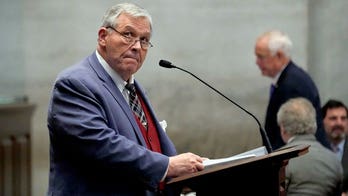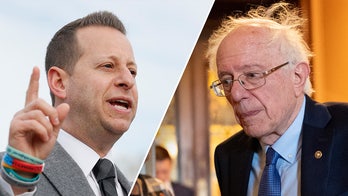Secretary of State Hillary Clinton seized on an opportunity Wednesday to take a shot at Dick Cheney in front of a House committee, telling lawmakers that she did not view the former vice president as a "particularly reliable source" on issues of torture.
Clinton offered a sarcastic reply when asked about Cheney's request this week to declassify documents showing the "success" of some widely condemned, harsh interrogation techniques launched by former President Bush after the Sept. 11 terrorist attacks.
"It won't surprise you that I don't consider him a particularly reliable source," Clinton said with laughter before the House Foreign Affairs Committee.
Last week, the Obama administration released classified Bush-era legal memos detailing the interrogation program and opened the door for prosecutions against the lawyers who wrote those memos.
Click here to listen to FOX Radio's Todd Starnes
In an interview with FOX News' Sean Hannity aired on Monday night, Cheney questioned the point of releasing the legal decisions behind the interrogations but not the outcome of them.
"One of the things that I find a little bit disturbing about this recent disclosure is they put out the legal memos, the memos that the CIA got from the Office of Legal Counsel, but they didn't put out the memos that showed the success of the effort," he said.
Clinton said Wednesday she supports a "nonpolitical," "nonpartisan" review of the interrogation program.
"I believe we ought to get to the bottom of this entire matter," she said. "I think it is in the best interest of our country and that is what the president believes."
Clinton also defended using diplomacy with Iran.
By trying to talk Iran out of its nuclear program, the U.S. is in a better position to organize tougher international sanctions in the event that diplomacy fails, Clinton said.
"We actually believe that by following the diplomatic path we are on, we gain credibility and influence with a number of nations who would have to participate in order to make the sanctions regime as tight and as crippling as we would want it to be," Clinton told the committee.
Iran denies that its nuclear program is intended to develop weapons.
The official Iranian news agency IRNA reported Wednesday that Iran welcomes a "constructive" dialogue with world powers over its nuclear program, but insisted that it won't halt its uranium enrichment activities.
The Iranian report was in response to an invitation from the United States, Britain, China, France, Germany and Russia for a new round of nuclear talks. No date has been set.
Clinton said the administration is confident that with the help of international partners, it can put together a comprehensive sanctions regime against Iran, "should we need it." She said it would be needed "in the event we are unsuccessful or stonewalled in our other approach."
The House hearing was Clinton's first congressional testimony since her confirmation hearing in January, and the questions were mostly friendly. Panel members initially focused mainly on Iran, the Islamic extremist threat in Pakistan and U.S. policy toward Cuba. Some Republicans pressed her on the administration's release of formerly classified documents on detainee interrogation methods used during the Bush administration, but she deflected those inquiries, saying it was not a matter for her to discuss publicly.
Florida Rep. Ileana Ros-Lehtinen, ranking Republican on the committee, said many of the administration's priorities are questionable.
"Another item of grave concern is the administration's plan to provide more than $900 million in aid for West Bank and Gaza," she said. "In Gaza, this is tantamount to bailout for Hamas."
Clinton was at her most emotional in batting down questions from Reps. Chris Smith, R-N.J., and Jeff Fortenberry, R-Neb., about the Obama administration's support for international family planning services. Smith and Fortenberry are among Capitol Hill's staunchest abortion opponents.
Smith asked if the administration was seeking "in any way to weaken or overturn pro-life laws and policies in African and Latin American countries." Fortenberry asked: "Is forcing U.S. taxpayers to fund abortion in keeping with the highest values of the United States of America?"
"We have a very fundamental disagreement," Clinton told Smith, describing how she had seen women suffering in Africa, Latin America and Asia because of inadequate family planning and health care.
"It is my strongly held view that you are entitled to advocate, and everyone who agrees with you should be free to do so, anywhere in the world and so are we," Clinton said. "We happen to think that family planning is an important part of women's health and reproductive health includes access to abortion that I believe should be safe, legal and rare."
On Iran, Clinton said its nuclear program are one of the administration's highest foreign policy priorities.
"We are deploying new approaches to the threat posed by Iran and we're doing so with our eyes wide open and with no illusions," she said.
"We know the imperative of preventing Iran from obtaining nuclear weapons," she added. "After years during which the United States basically sat on the sidelines, we are now a full partner" in international talks on Iran.
The committee chairman, Rep. Howard Berman, D-Calif., asked Clinton how much time it would take to get results on Iran. She did not reply directly but said the administration believes it has set the stage for progress by interacting more directly with allies and by reaching out to the Iranian authorities.
"It is going to be a more successful engagement if our partners around the world understand they must work with us," including on consultations aimed at imposing tougher sanctions on Iran, Clinton said.
"The fact that we are engaging ... actually gives us more leverage with other nations."
Clinton was asked about the case of Robert Levinson, a retired FBI agent from Coral Springs, Fla., last seen on Iran's Kish Island on March 8, 2007. He disappeared while investigating cigarette smuggling for a client of his private security firm. Clinton complained that "there has been nothing coming out of the Iranian government" on Levinson and said the administration would not give up on the case.
In her opening remarks to the panel, Clinton said the core goal of President Obama's anti-terror strategy is to defeat al-Qaida and prevent its return to Afghanistan.
Berman said the panel is concerned about Islamic extremists gaining momentum in Pakistan. The California Democrat said the U.S. cannot allow the extremists to take over Pakistan or to operate with impunity on Afghanistan's border.
Clinton asserted in response that the international community is working closely together to address the problem of extremism in both Afghanistan and Pakistan.




